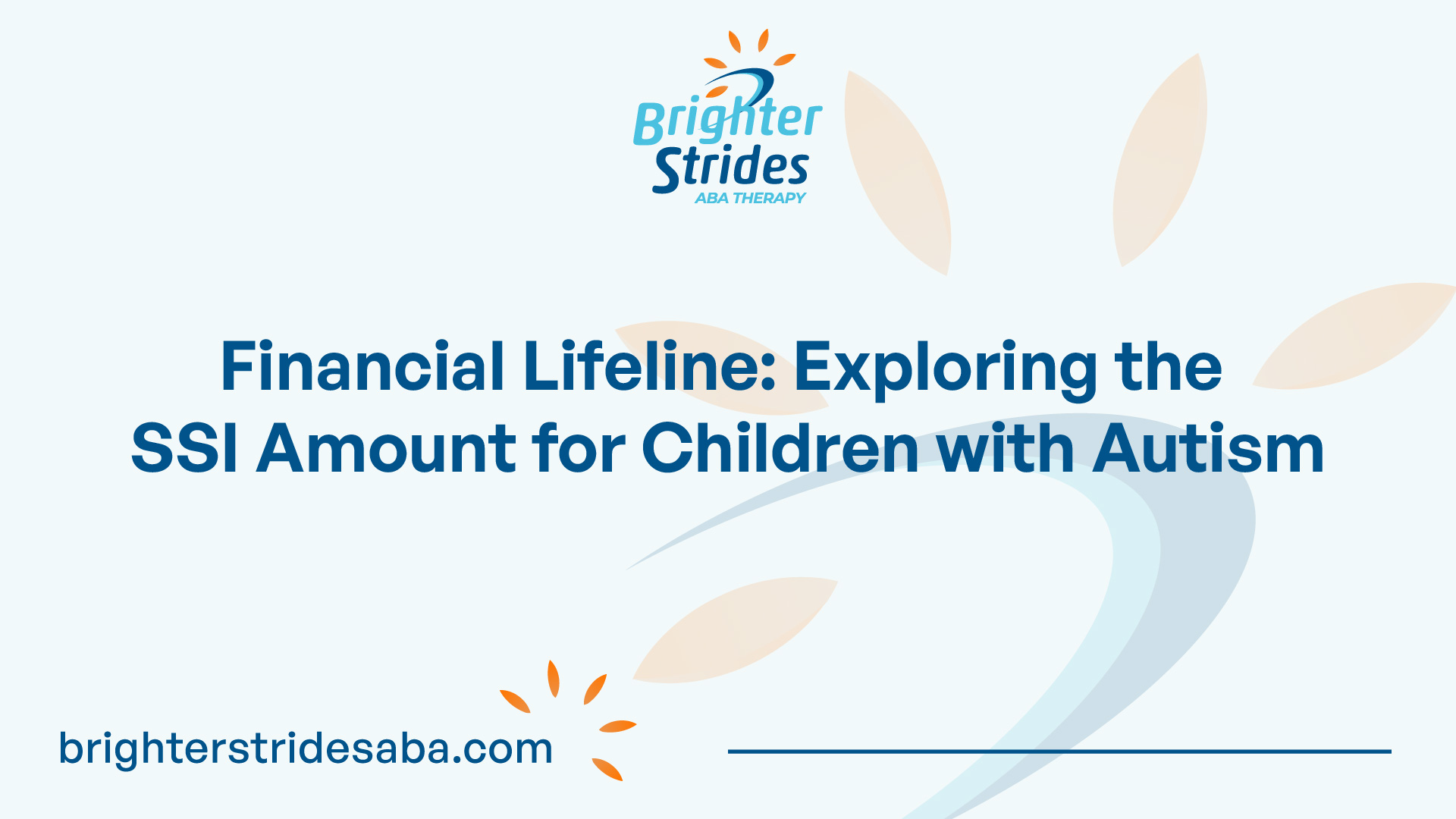Understanding SSI for Children with Autism
Supplemental Security Income (SSI) provides crucial financial support to low-income families with children who have developmental and behavioral disabilities, including autism spectrum disorder (ASD) and physical impairments. SSI is a needs-based disability program administered by the Social Security Administration (SSA) that offers monthly benefits to individuals with limited income and resources who meet the program’s eligibility criteria.

Supplemental Security Income (SSI) Overview
SSI is designed to assist disabled individuals, blind individuals, and those aged 65 or older who have limited income and resources. Children who are blind or disabled, including those with autism, may also be eligible for SSI benefits. The program aims to provide financial assistance to help cover basic needs such as food, shelter, and clothing.
Eligibility Criteria for SSI Benefits
To qualify for SSI benefits, children with autism must meet Social Security’s definition of disability for children. This means they must have medically documented conditions that result in deficits in communication, social interaction, and restrictive/repetitive patterns of behavior. Parents play a crucial role in providing the necessary medical documentation to prove their child’s condition.
In addition to meeting the disability criteria, parents or guardians of children with autism must also meet certain financial requirements. The income and resource limitations set by the SSA must not be exceeded for a child to qualify for SSI benefits. Financial limitations are a common reason children with autism are denied SSI benefits. The income cap varies and increases with the number of wage-earning adults and children in the household.
It is important for parents to start the claim for SSI benefits as soon as possible, as the application process can take several months. Making an appointment at the local SSA office and preparing the necessary paperwork, including medical documentation, is advised. The SSA’s Child Disability Starter Kit can provide guidance on the required documentation and steps involved in the application process.
Understanding the eligibility criteria for SSI benefits is crucial for families seeking financial support for their child with autism. By meeting the necessary disability and financial requirements, families can access the vital assistance provided by the SSI program.
Factors Affecting SSI Benefits for Children with Autism
When it comes to Supplemental Security Income (SSI) benefits for children with autism, several factors come into play that determine the amount they may receive. These factors include the maximum monthly benefit for SSI, income and resource limitations, and the deeming of parental income.
Maximum Monthly Benefit for SSI
The maximum monthly benefit for SSI can vary from year to year. In 2024, the maximum monthly benefit for SSI is $943 per individual. However, the actual amount a child with autism can receive depends on various factors, such as income, resources, and living arrangements .
Income and Resource Limitations
To determine eligibility for SSI benefits, the financial resources and income of the child and their family are taken into consideration. The child’s countable income plays a significant role in calculating the SSI payment amount. Every SSI recipient’s monthly payment starts at a total benefit amount deemed by their state and is lowered by their “countable income.” The full federal monthly benefit for 2022 is $841.
Deeming of Parental Income
The deeming of parental income is a crucial factor in SSI benefit calculations for children with autism. It involves a complex formula that determines how much of a parent’s earnings and assets are included as income for the child, which impacts the monthly SSI payment amount. The financial resources and income of the family are taken into account to assess the child’s eligibility for SSI benefits.
In addition, if there are non-disabled siblings in the household, their presence can affect the SSI payment amount. The sum deducted for a non-disabled child in the home is the difference between the federal SSI allotment for an individual ($841 in 2022) and a couple ($1261 in 2022), resulting in a deduction of $420 per non-disabled child in the home.
Understanding these factors is crucial for families seeking SSI benefits for their child with autism. It is recommended to consult with a financial advisor or seek assistance from organizations specializing in SSI to navigate the complex eligibility criteria and calculations. By understanding how these factors affect SSI benefits, families can better plan and manage their financial resources to support their child’s needs.
Calculating SSI Benefits for Children with Autism
When determining the Supplemental Security Income (SSI) benefits for children with autism, several factors come into play. It’s important to understand how countable income, non-disabled siblings, and regional variations can impact the amount of SSI payments.
Determining Countable Income
Countable income plays a significant role in calculating SSI benefits for children with autism. The countable income is the sum of all income sources that are considered when determining eligibility for SSI benefits. This includes the child’s income, if applicable, as well as the income of their parents or guardians.
The full federal monthly SSI benefit amount for 2022 is $841. However, this amount can vary depending on individual circumstances, and deductions are made based on the parents’ income after considering it. Generally, the smaller the household income, the larger the disability benefit check.
Impact of Non-Disabled Siblings
The presence of non-disabled siblings in the household can affect the SSI benefits for a child with autism. For each non-disabled child in the home, a deduction is made from the total benefit amount. The deduction is calculated by taking the difference between the federal SSI allotment for an individual ($841) and a couple ($1261) for 2022, resulting in a deduction of $420 per non-disabled child in the home.
Regional Variations in SSI Payments
It’s important to note that SSI payments can vary regionally. Each state has the option to supplement the federal SSI benefit with additional funds. The supplemental amount can vary, depending on the state and its specific regulations. Therefore, the total SSI benefit amount for a child with autism may differ depending on the state in which they reside.
To get the most accurate and up-to-date information regarding SSI payments for children with autism, it is recommended to consult with the Social Security Administration or a qualified professional who can provide guidance specific to your location.
Understanding how countable income, non-disabled siblings, and regional variations affect SSI payments for children with autism is crucial for families seeking financial support. By considering these factors, families can better plan and navigate the process of obtaining the appropriate SSI benefits for their child with autism.
Applying for SSI Benefits for a Child with Autism
When it comes to applying for Supplemental Security Income (SSI) benefits for a child with autism, there are several important factors to consider. This section will explore the process of applying for SSI benefits, including the necessary medical documentation, the application process itself, and timelines and considerations to keep in mind.
Medical Documentation and Eligibility
Parents applying for SSI benefits for their child with autism must provide medical evidence of their child’s symptoms and demonstrate a significant limitation in at least two specific areas for eligibility [3]. To qualify for SSI, a child under the age of 18, including those with autism, must have a medically determinable physical or mental impairment that results in marked and severe functional limitations.
It is important for families to gather and provide documentation to prove their child’s disability through medical records and income levels of the household. This evidence will support the child’s eligibility for SSI benefits.
The Application Process
Parents of children with autism should start the SSI benefits application process as soon as possible, as it can take several months to complete. It is recommended to make an appointment at the local Social Security Administration (SSA) office and prepare the necessary paperwork. The SSA provides a Child Disability Starter Kit that can guide parents through the application process.
When filling out the application, parents will need to provide detailed information about their child’s medical condition, including diagnoses, treatments, and medical professionals involved in their care. It is crucial to accurately and thoroughly complete the application forms to ensure a smooth review process.
Timelines and Considerations
It is important to be aware that the application process for SSI benefits can take time. Parents should anticipate potential delays and be patient throughout the process. It is recommended to keep copies of all submitted documents and maintain open lines of communication with the SSA.
Once the application is submitted, the SSA will review the information provided and assess the child’s eligibility for SSI benefits. If the initial application is denied, there is an opportunity to appeal the decision. It is crucial to follow the SSA’s guidelines and timelines for appeals to ensure the best possible outcome for the child.
Families should also note that the amount of SSI benefits a child with autism receives can vary significantly. The monthly benefit amount depends on various factors, including the child’s disability and the household’s income and resources. Some children may receive over $600 per month, while others may receive a lesser amount.
It is important to remember that SSI benefits are intended to assist families in covering costs related to their child’s disabilities. If a child is ultimately deemed ineligible for SSI benefits, they do not have to repay the payments received during the application process.
By understanding the necessary medical documentation, following the application process, and being aware of the timelines and considerations, parents can navigate the process of applying for SSI benefits for their child with autism. It is crucial to seek guidance from the SSA and gather all the necessary information to ensure a successful application.
Supplemental Security Income (SSI) vs. Social Security Disability Insurance (SSDI)
When considering financial support for individuals with autism, it’s important to understand the differences between Supplemental Security Income (SSI) and Social Security Disability Insurance (SSDI). While both programs provide benefits to individuals with disabilities, they have different eligibility criteria and payment structures.
SSI Benefits for Children with Autism
Supplemental Security Income (SSI) is a needs-based disability program that provides benefits to people with limited income and resources who are disabled, blind, or age 65 or older. Children who are blind or disabled, including those with autism, may also qualify for SSI benefits.
To be eligible for SSI benefits, the child must meet certain criteria, including having a qualifying disability and limited family income and resources. The amount of SSI benefits received for children with autism varies depending on factors such as parental income and resources, as well as the state of residence. The Social Security Administration provides a monthly maximum benefit amount for SSI, which is adjusted annually. However, the actual amount received may be lower based on individual circumstances.
SSDI Benefits for Adults with Autism
Social Security Disability Insurance (SSDI) is another avenue through which individuals with disabilities, including autism, can receive benefits. SSDI pays benefits to individuals who cannot work due to a disability that is expected to last at least one year or result in death, as long as they have paid enough into the Social Security program.
For adults with autism, SSDI benefits may be available if the disability began prior to the age of 22. These benefits are considered a “child’s” benefit paid on a parent’s Social Security earnings record. The amount of SSDI benefits an adult with autism receives depends on the parent’s earnings record and the individual’s work history, if applicable.
It’s important to note that both SSI and SSDI benefits are subject to change and are influenced by various factors, including income, resources, and individual circumstances. For specific information regarding eligibility and benefit amounts, it is recommended to consult with the Social Security Administration or a qualified financial advisor.
Understanding the differences between SSI and SSDI can help families and individuals with autism navigate the financial support options available to them. These programs aim to provide assistance to individuals with disabilities, ensuring they have access to the financial resources they need for their well-being and quality of life.
Financial Support Options for Families of Children with Autism
Families of children with autism often face additional financial burdens due to the unique needs associated with the condition. Fortunately, there are several financial support options available to help alleviate some of the financial strain. In this section, we will explore three important avenues of support: the Achieving a Better Life Experience (ABLE) Act, Medicaid waivers, and the Children’s Health Insurance Program (CHIP).
Achieving a Better Life Experience (ABLE) Act
The Achieving a Better Life Experience (ABLE) Act of 2014 introduced a new savings option for families of individuals with disabilities. ABLE accounts allow families to save for long-term expenses without jeopardizing eligibility for Medicaid and Supplemental Security Income (SSI). These tax-advantaged savings accounts can provide a financial cushion to cover disability-related expenses such as education, housing, transportation, and healthcare.
By contributing to an ABLE account, families can accumulate funds to support their child’s future needs while maintaining eligibility for means-tested benefits. It’s important to explore the specific rules and regulations regarding ABLE accounts in your state, as they may vary.
Medicaid Waivers
Medicaid waivers offer valuable support services and care to individuals with developmental disabilities, including autism. These waivers help individuals remain at home or in the community, rather than being institutionalized. Medicaid waiver programs differ from state to state, with varying eligibility criteria and availability.
By qualifying for a Medicaid waiver, families can access essential services such as respite care, behavioral therapy, occupational therapy, and speech therapy. These waivers can significantly reduce the financial burden associated with providing comprehensive care for a child with autism. It’s important to research the specific waiver programs available in your state and understand the application process.
Children’s Health Insurance Program (CHIP)
The Children’s Health Insurance Program (CHIP) provides health insurance coverage for eligible children under the age of 19 who do not have access to other health insurance options. CHIP can be a valuable resource for families of children with autism who require medical services and treatments.
In most states, children who receive SSI benefits are automatically eligible for Medicaid, which can help cover medical expenses. Even if a child is not eligible for SSI benefits, they may still qualify for Medicaid under other state rules. However, it’s important to note that children living with a parent in military service overseas may receive SSI benefits but are not eligible for Medicaid.
CHIP provides access to comprehensive health coverage, including doctor visits, vaccinations, hospital care, prescription medications, and mental health services. Eligibility requirements and coverage details may vary by state, so it’s important to research the specific CHIP programs available in your state and determine if your child qualifies.
By exploring these financial support options, families of children with autism can access resources and services that help alleviate the financial burden associated with their child’s condition. It’s important to research and understand the eligibility criteria, application processes, and available benefits for each program to make informed decisions and maximize the support available.
Applying for SSI Benefits for a Child with Autism
Medical Documentation and Eligibility
The Application Process
Timelines and Considerations
Applying for Supplemental Security Income (SSI) benefits for a child with autism involves several steps and considerations. It is important to gather the necessary medical documentation and understand the eligibility criteria before initiating the application process. This section will guide you through the essential aspects of applying for SSI benefits for a child with autism.
Medical Documentation and Eligibility
To qualify for SSI benefits, children with autism must meet certain criteria, including deficits in communication, social interaction, and restrictive/repetitive patterns of behavior. The Social Security Administration requires medical documentation from parents or guardians to prove these conditions. Gather all relevant medical records, including evaluations, diagnoses, and treatment plans, to support the child’s eligibility for SSI benefits.
The Application Process
Parents or guardians should initiate the application process for SSI benefits as soon as possible, as it can take several months to complete. Start by making an appointment at the local Social Security Administration (SSA) office to discuss the child’s eligibility and submit the necessary paperwork. It is recommended to refer to the SSA’s Child Disability Starter Kit to ensure all required documentation is prepared.
During the application process, parents will be required to provide detailed information about the child’s medical history, treatment, and functional limitations. The SSA may also require additional assessments or examinations to evaluate the child’s eligibility for benefits.
Timelines and Considerations
It is important to be aware of the timelines and considerations associated with the SSI application process for a child with autism. The process can be lengthy, so starting early is crucial. Once the application is submitted, it may take several months to receive a decision from the SSA.
During the waiting period, it is advisable to keep copies of all documentation related to the application. This includes any correspondence with the SSA, medical records, and evaluations. These records can be helpful if there is a need to appeal a denial or provide additional information.
Additionally, it is important to note that even if a child is not eligible for SSI benefits, they may still be eligible for Medicaid under other state rules. In most states, a child who receives SSI benefits can automatically receive Medicaid to help cover medical expenses. Medicaid provides essential healthcare coverage, and its availability may vary by state.
By understanding the application process, gathering the necessary medical documentation, and being aware of timelines and considerations, parents can navigate the application process for SSI benefits for their child with autism. It is recommended to seek guidance from the SSA or consult with professionals experienced in assisting families with SSI applications to ensure the best possible outcome.
References
- https://lighthouseautismcenter.com/blog/how-a-child-with-autism-qualifies-for-ssi-benefits/
- https://specialneedsanswers.com/supplemental-security-income-ssi-for-children-with-autism-19640
- https://apollobehavior.com/ssi-autism-financial-support/
- https://www.autismparentingmagazine.com/child-ssi-benefits/
- https://blog.ssa.gov/recognizing-the-needs-of-people-on-the-autism-spectrum-and-their-families/
- https://www.autismspeaks.org/financial-autism-support
- https://www.ssa.gov/ssi/text-child-ussi.htm




